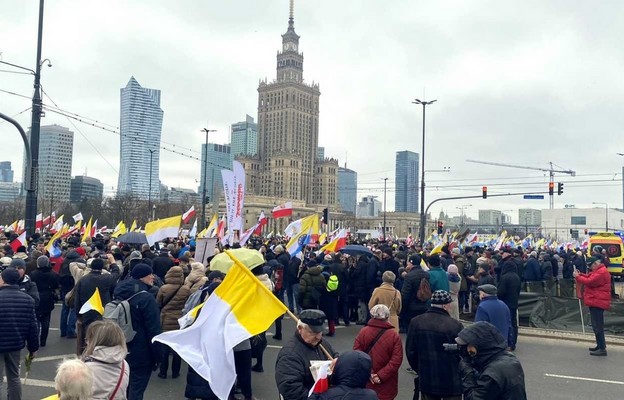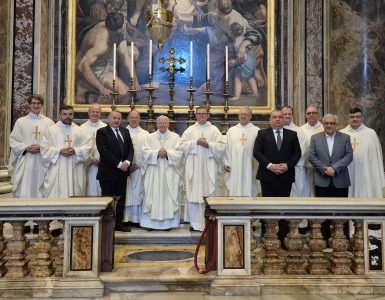Hundreds of thousands of people gathered for Papal Marches organized in Poland and beyond to commemorate the 18th anniversary of the death of Saint John Paul II, according to the organizers. The largest event was organized in Warsaw, where tens of thousands of people appeared in the city center. The organizers of the Papal Marches emphasize that the demonstrations are a testimony of attachment and pride for the life of St. John Paul II. At the same time, they are also a response to what they call attempts to undermine the sanctity and merits of the Polish Pope.
“The participation in the march is a way to thank the great Pole, John Paul II, for leaving to future generations the legacy of love and faith,” wrote the organizers of the Papal March in Bialystok, in the east of the country. In turn, joint demonstrations called National Papal Marches were organized in Warsaw, Szczecin, and Krakow, the city where the future pope – first as a student, later as a priest and bishop – was associated with for decades of his life.
The initiator of the Warsaw march, Malgorzata Zaryn, emphasized that the Papal March should be an expression of unity, not polarization. “We want to restore the person and teaching of the pope – a Pole – to our community, and restore our community thanks to him,” she said.
“We want to show with all our might that the Polish Pope is an important figure for many of us, and we are grateful to him for what he has done for the Krakow and universal Church, for Poland and the world, but also for each of us,” we read on the website of the Krakow Archdiocese. The march in Krakow was described as “white”.
“John Paul II’s figure is close to me. His teachings, charisma, the power of his influence. All of this made me not have to think deeply, just a reflex of the heart in defense of moral authority,” said actor Marcin Kwasny about his participation in the march.
Participants of the demonstrations across the country carried crosses, national and papal flags, and numerous portraits of St. John Paul II. Many marches ended with Holy Masses.
In addition, evening prayer meetings will also take place in many places to honor the pope who passed away on April 2, 2005, at 9:37 p.m. A special event is planned in the hometown of John Paul II – Wadowice. The artistic show “Nobody Will Replace You” will remind of the most important events, papal songs, and homilies of St. John Paul II.
“Father John Paul II spoke about everyone having their Westerplatte, the last outpost, the last line of defense that cannot be withdrawn from. I have the impression that today my Westerplatte and the Westerplatte of many Poles have been attacked. We cannot withdraw from this line of defense. We must stand and endure here until the end,” said television journalist Rafał Patyra, referring to opposition to recent publications regarding John Paul II.
Many of those present also emphasized their disagreement with the accusations against Cardinal Wojtyła that he did not react adequately to the issue of protecting children and young people when he was the Archbishop of Krakow. These reports were questioned by numerous historians and journalists, who pointed out that the authors of these materials uncritically relied on unreliable or even fabricated documents of the communist security service. The hostile authorities of the PRL regime, who were opposed to the Church, never used these reports to attack Karol Wojtyła, a popular Church hierarch who was inconvenient for the communist system in Poland.
niedziela.pl





